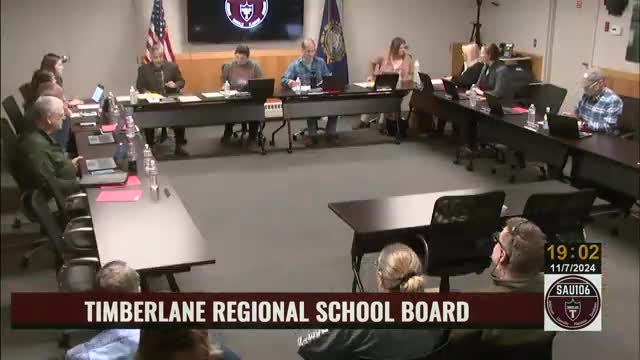Parents praise Timberlane playgroup and in-school ABA support after early gains for autistic child
Get AI-powered insights, summaries, and transcripts
Subscribe
Summary
Parents at the Timberlane School Board meeting described rapid early progress after enrolling their son in a new playgroup and an in-house ABA support program at Sandown Central, saying the services helped the child gain speech, social skills and potty-training milestones.
At the Nov. 7 Timberlane Regional School District School Board meeting, parents Lindsay and Matthew Bleich described significant progress their son Michael has made after enrolling in a district playgroup and an in-house applied behavior analysis support program at Sandown Central. Kim Rivers, the building leader and early childhood coordinator, introduced the district’s expanded playgroup and the in-school ABA supports.
Board members and administrators heard that the playgroup, open to children roughly 2½ to 5 years old, began as a single weekly one-hour session, expanded to 90 minutes, and now offers a second session because of demand. A letter read aloud from Danielle Russell, a Sandown resident, said the playgroup eased her younger child’s transition to pre-K and that she hoped the district would keep the program as a permanent offering.
Parents Lindsay and Matthew Bleich detailed Michael’s diagnosis and services, saying he is preverbal, has autism, avoidant/restrictive food intake disorder (ARFID) and elopes. They told the board Michael receives full-time ABA therapy through ABA Centers of America and that the district’s in-house program would provide a full-time one-to-one registered behavioral technician (RBT) on site, transportation, half-day inclusion in pre-K, and on-site speech and occupational therapy.
“We would try the program and see what kind of progress Michael could make,” Lindsay Bleich said. After several months in the program, the family reported “leaps and bounds” in Michael’s development: new songs, improved eye contact, progress with potty training and more consistent sleep.
Kim Rivers and district staff explained that families may remove a child from the program if it does not prove successful, and the board’s special-education administrator described the formal IEP-team process for reviewing placement and, if needed, pursuing out-of-district placements.
Board members praised the program and the district’s decision two years earlier to replace a principal position at Sandown Central with an early childhood coordinator having special-education expertise. Several board members and staff emphasized the value of early intervention and the collaborative model the district is using.
The public-comment item concluded with board members thanking the family and Kimberly Rivers for their work and participation.
